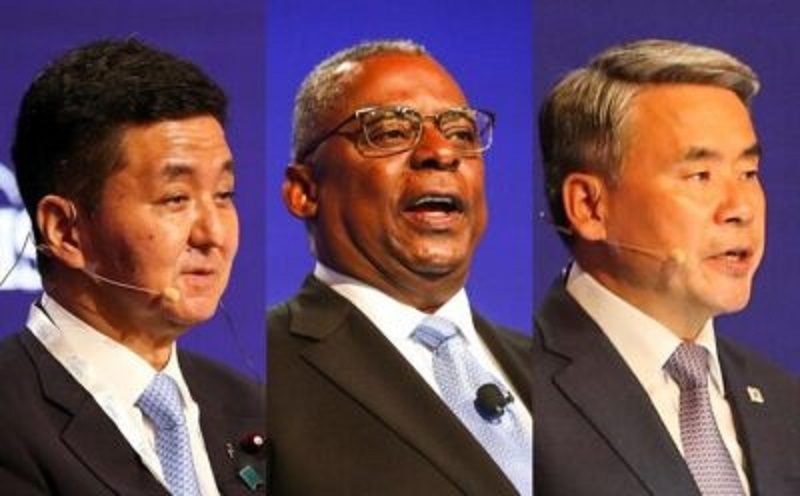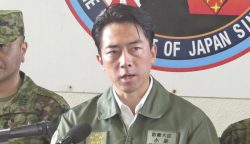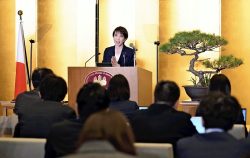
From left: Japanese Defense Minister Nobuo Kishi, U.S. Secretary of Defense Lloyd Austin, South Korean Defense Minister Lee Jong-sup. In the Asia’s annual defense and security forum, in Singapore, Saturday, June 11, 2022.
20:00 JST, June 13, 2022
SINGAPORE/SEOUL — The defense chiefs of Japan, the United States and South Korea have agreed to take concrete measures to boost their trilateral security cooperation, including the resumption of joint exercises to search and track ballistic missiles and the sharing of security-related information.
Defense Minister Nobuo Kishi, U.S. Defense Secretary Lloyd Austin and South Korean Defense Minister Lee Jong-sup met Saturday in Singapore on the sidelines of an Asia security conference.
Amid North Korea’s continued pursuit of improved missile capabilities, the defense authorities of Japan and South Korea have finally embarked on improving their relations, thanks to the mediation of the United States.
“North Korea’s habitual provocations and missile tests only underscore the urgency of our task,” Austin said in his speech Saturday at the Shangri-La Dialogue security meeting. “And so we are deepening the security cooperation among the United States, Japan and the Republic of Korea.”
In recent years, North Korea has repeatedly test-fired advanced hypersonic missiles and projectiles that fly at low altitudes on irregular trajectories. Low altitude missiles are difficult for Japan’s Self-Defense Forces radars to detect. To intercept them, it is important to improve the readiness to swiftly share information with South Korean forces that are closer to the North’s missile launch sites.
For Japan, the United States and South Korea to enhance their interception readiness, they must urgently resume joint drills with Aegis-equipped ships.
To strengthen the trilateral cooperation, U.S. President Joe Biden’s administration made moves to help Japan and South Korea reconcile, taking as an opportunity the inauguration of conservative South Korean President Yoon Suk-yeol on May 10.
Washington prioritized having Japan and South Korea enter practical partnerships in response to common issues related to North Korea.
For Tokyo and Seoul to settle the issues of history that have caused friction will take a much longer time.
Tokyo’s issues with Seoul
“We recognize the importance of trilateral interaction among Japan, the United States and South Korea, and the bilateral one between Japan and South Korea,” Kishi said to reporters after Saturday’s first such trilateral meeting in 2½ years. “The importance to jointly deal with the situation in North Korea has increased more than ever.”
Yet there were twists and turns before the latest agreements were reached.
Japan’s relations with South Korea had deteriorated to what has been called “the worst since World War II” under the previous South Korean administration of President Moon Jae-in. This cast shadows on the concerted effort among the three countries.
A particularly hard to eradicate tension between the defense authorities of Japan and South Korea developed when a South Korean destroyer directed its fire-control radar at a Maritime Self-Defense Force plane in December 2018.
Following the incident, Japan lodged a strong protest against South Korea. But Seoul completely denied the facts and instead claimed that the MSDF was to blame, thereby making the SDF distrust the South Korean military.
Furthermore, the Moon administration announced in August 2019 its decision to withdraw from the General Security of Military Information Agreement with Japan. The GSOMIA had been in effect since the administration led by Moon’s predecessor, Park Geun-hye. Although Seoul reversed its decision to end the GSOMIA shortly before its expiration in November that year, intelligence-sharing between the two countries has remained almost in a state of paralysis ever since.
Public opinion matters
Challenges remain for the Yoon administration as well in moving ahead with boosting trilateral security cooperation.
In the defense chief’s joint statement released Saturday, it reads, “The Ministers discussed other regional security issues and concurred in the importance of deepening trilateral cooperation on key issues to promote a free and open Indo-Pacific region, including information sharing, high-level policy consultations, and combined exercises.”
An official connected to South Korea’s Defense Ministry said that “envisaged are detecting submarines and conducting humanitarian disaster relief exercises.”
To expand such trilateral security cooperation, it would be essential for the overall bilateral relations between Japan and South Korea to improve, including over the issue of historical perceptions, and public opinion within South Korea.
Public opinion in South Korea is quite sensitive to cooperation between the South Korean military and the SDF, with leftist parties that view Japan harshly no doubt criticizing the administration over such a development. The Yoon administration thus has to tread carefully.
Top Articles in Politics
-

LDP Wins Historic Landslide Victory
-

LDP Wins Landslide Victory, Secures Single-party Majority; Ruling Coalition with JIP Poised to Secure Over 300 seats (UPDATE 1)
-

Japan Tourism Agency Calls for Strengthening Measures Against Overtourism
-

CRA Leadership Election Will Center on Party Rebuilding; Lower House Defeat Leaves Divisions among Former CDPJ, Komeito Members
-

Voters Using AI to Choose Candidates in Japan’s Upcoming General Election; ChatGPT, Other AI Services Found Providing Incorrect Information
JN ACCESS RANKING
-

Japan Institute to Use Domestic Commercial Optical Lattice Clock to Set Japan Standard Time
-

Israeli Ambassador to Japan Speaks about Japan’s Role in the Reconstruction of Gaza
-

Man Infected with Measles May Have Come in Contact with Many People in Tokyo, Went to Store, Restaurant Around When Symptoms Emerged
-

Prudential Life Insurance Plans to Fully Compensate for Damages Caused by Fraudulent Actions Without Waiting for Third-Party Committee Review
-

Woman with Measles Visited Hospital in Tokyo Multiple Times Before Being Diagnosed with Disease

























